Who Has the Ultimate Authority? A Biblical Look at Sola Scriptura
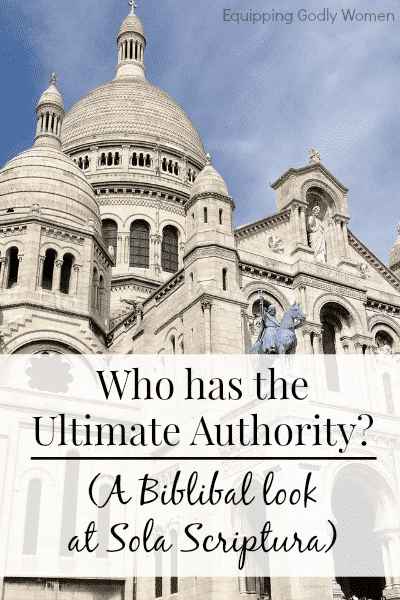
This post is post 5 in a series entitled Letting God Lead: My Journey Through Protestant and Catholic Beliefs. While you certainly can read this post by itself, I highly encourage you to check out the rest of the series as well. Find more about this series and a list of all of posts here. *This post contains affiliate links.
Pilgrimages are rarely easy, and my journey through Protestant and Catholic beliefs has certainly been no exception. When I first began this journey, I though I’d be looking through the issues one by one, checking off boxes on an imaginary master checklist. Instead, it’s been a jumbled mess of facts, opinions and emotions. And every time I turn around, another piece of foundation crumbles away, leaving me feeling shaky and uncertain.
I’m a lifelong Christian, a Bible college graduate, a teacher, a mom, and a Christian blogger. I’m supposed to have all the answers. I don’t like feeling uncertain. And yet that’s exactly what this journey has been.
My findings on the Eucharist were the first huge chunk of foundation that I felt being pulled out from under me. Today’s post, on the authority of the Bible and Church Tradition, was the second. Honestly, I swear I almost felt the ground move. It was like everything suddenly shifted, even if I didn’t know what it all meant at first (or even still).
When I sat down to map out this series, I initially was going to save this post for last. It’s kind of like the period at the end of the sentence, and if you really accept and embrace it, none of the rest of the posts will matter much. But then I realized I needed to move it up. Because it also provides a framework that will be essential as we dive into the remaining posts.
A Protestant View of the Bible
Several months ago, I read a post on Catholic.com that would change my perspective forever. In Should Catholics go to Non-denominational Bible Studies?, author Steve Ray highlights four tenants Protestants generally believe about the Bible.
- Scripture is the only binding authority.
- There is no official interpretation or interpreter.
- The Bible is easy to understand.
- Each individual can and should read and understand the Bible for himself.
Yes. I definitely recognized these teachings from my Protestant upbringing. Growing up, I was taught that the Bible was the absolute authority on everything it spoke about. The Bible was never wrong, and if you wanted an answer to some pressing theological or moral dilemma, all you had to do was simply open the Bible, read what it said and you’d find your answer.
In fact, in the back of many Protestant Bibles, you’ll even find extensive reference sections to help you quickly locate a great verse on any topic you like. The Bible I received when I graduated high school has the following sections (and more):
- Well-known Biblical Events
- Parables of the Old Testament
- Miracles of the New Testament
- Teachings of Jesus
- Promises from the Bible
- Dictionary
- NIV Concordance
- Index to Subjects
- Index to Articles
No matter what problem or struggle I was facing, all I had to do was open the Bible, and the answer would be waiting for me right there on the page, plain as day. What more could I need?
A Catholic View of the Bible
Ray then goes on to list four major Catholic beliefs regarding the Bible, with Scripture references for each.
- The Church preceded the Bible and the Tradition of the church is an equally infallible authority.
- The interpretation of the Bible is the prerogative of the Catholic Church.
- The Bible is not easy to understand.
- Individuals should read the Bible for themselves, but within the framework of the Church’s authoritative teaching and not based on their own private interpretation.
And the more I thought about it and researched it… I worried… Uh oh. Could they be right? Here’s what I found.
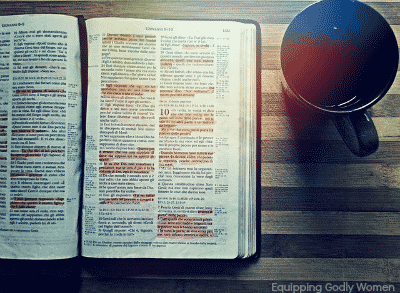
1. The Bible Wasn’t Around Right Away
With our constant and easy access to the Bible today, it’s easy to forget that the first century Christians weren’t so lucky. The Bible books may have begun circulating in the first century, but it wasn’t until the late 4th century that canon was officially decided upon–300 years after the last apostle died. And even after the Bible was compiled, the printing press wasn’t invented yet, so the Bible still wasn’t available to the average lay person.
So how did the early Christians learn about Jesus? They had to look to the church. The church was the authority from the beginning. It had to be.
2. The Bible Was Written by the Apostles
Secondly, there’s the fact that not a single word of the Bible was written by Jesus himself. The Bible isn’t this stand-alone authority that came down from Heaven to answer our questions. Who wrote the New Testament? The church.
And if the church had the authority and ability to author the Bible (under the direction of the Holy Spirit, of course) and to make an infallible decision as to which books made the cut two thousand years ago, then what is stopping the church* from maintaining that same authority and infallibility today? Or did they just happen to have a lucky guess once?
*Just to be clear, I’m talking about official church doctrine ONLY, not how individual Christians do or do not live it out.
The Bible doesn’t have authority because IT says so; it has authority because the Church says so. The Bible is a gift from the church, not the head of the church.
3. The Bible Isn’t a Comprehensive “How-to Guide”
Furthermore, we have to consider the purpose behind WHY the Bible was written. The apostles never sat down to write an official “how-to guide” that would address every issue. Instead, they wrote letters concerning very specific issues to very specific churches and individuals. The Bible was never meant to be an exhaustive source, but a helpful tool.
So yes, the Bible does hold authority on everything it teaches, but there are plenty of things it doesn’t teach on. So… how do we know the answer for the things the Bible doesn’t teach on? Who gets to decide?
4. There is NO Scriptural Basis for “Sola Scriptura”
Did you know that nowhere in the Bible does it teach the idea that we are to rest on the Bible alone? It says it is good for teaching, but it does not say it is the ONLY source of good teaching.
“All Scripture is God-breathed and is useful for teaching, rebuking, correcting and training in righteousness, so that the servant of God may be thoroughly equipped for every good work.” –2 Timothy 3:16-17
In fact, it actually says the Church is the foundation of truth–not the Bible.
“if I am delayed, you will know how people ought to conduct themselves in God’s household, which is the church of the living God, the pillar and foundation of the truth.” –1 Timothy 3:15
And when Christians had disputes, were they instructed to go to the Bible to see what it said? No, they were to take their disputes in front of the church–whether that was a minor dispute among brothers or a major theological discussion for which they had to hold a council.
5. Interpretations Vary Widely
Visit a couple churches (or read the comments section of this series!!) and you’ll quickly see that even the most knowledgeable and devoted Christians use the Bible to support all sorts of positions–many of which are in direct disagreement. Obviously there can only be one truth–so how do we know which interpretation is correct?
In Surprised by Truth, Bob Sungenis writes “I finally understood the value and necessity of Sacred Tradition. Tradition did not contradict the Bible, rather, it supported and made it clearer.”
Additional clarifying information… that’s what I had to find for the Eucharist post too. When all you have are the words “This is my body,” it’s easy to take them several different ways. But combine Scripture with history and Tradition, and a clearer, more accurate, picture begins to emerge. The new picture never contradicts the Bible; it simply clarifies it.
If just reading the Bible for ourselves was enough, we wouldn’t come up with 100 different interpretations. Clearly we need more information.
6. Jesus Promised to Send the Holy Spirit
Okay, I’ll admit I don’t find this argument that convincing personally, but from what I’ve heard it’s a HUGE one for Catholics, so I’m going to include it anyways and you can take it for what you will.
Essentially, Catholics believe that Jesus sent the Holy Spirit to guide them into all truth and to keep them on the right path based on these verses:
“I have much more to say to you, more than you can now bear. But when he, the Spirit of truth, comes, he will guide you into all the truth. He will not speak on his own; he will speak only what he hears, and he will tell you what is yet to come. He will glorify me because it is from me that he will receive what he will make known to you. All that belongs to the Father is mine. That is why I said the Spirit will receive from me what he will make known to you.” –John 16:12-15
“And I will ask the Father, and he will give you another advocate to help you and be with you forever” –John 14:16
“I will not leave you as orphans; I will come to you.” –John 14:18
“And surely I am with you always, to the very end of the age.” –Matthew 28:20b
Personally, I don’t see that these verses are talking about the church as a whole and not individuals, or that they are talking about official Catholic beliefs in particular instead of the church as a whole. I also don’t see that this means that we will never err. It says the Holy Spirit will LEAD us. That doesn’t necessarily mean we will follow.
BUT, I have to admit, for the church to hold so unwaveringly to its teachings from the first century until now, when so many denominations have fallen away and believed whatever they wanted too–well, that is pretty impressive. I’ll give them that 🙂
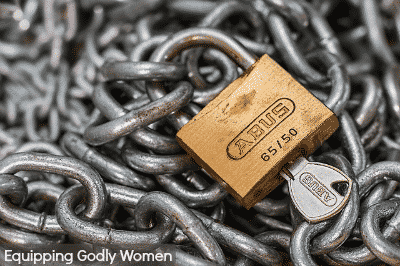
7. Power of Binding and Loosing
BUT the best reason of all can be found in these verses in the Bible:
“I will give you the keys of the kingdom of heaven; whatever you bind on earth will be bound in heaven, and whatever you loose on earth will be loosed in heaven.” –Matthew 16:19 (see also Matt. 18:18)
“Whoever listens to you listens to me; whoever rejects you rejects me; but whoever rejects me rejects him who sent me.” –Luke 10:16
In other words, Jesus gave the Church the authority that whatever they say goes. That’s a pretty big responsibility, and a whole lot of power.
It’s like when I have a babysitter come over watch my children. The babysitter is expected to have the kids follow my house rules as long as she knows them. But obviously I can’t write down what I would ask in EVERY single situation. So while I’m gone, I entrust my children to the babysitter and let her call the shots. While I’m gone, she has the authority to make and carry out any rules that she likes, as long as they are in line with what she knows to be true about me and the way I expect my children to behave.
It’s the same with the church. God is the ultimate authority. The Bible lists some rules and guidelines, but cannot possibly cover them all. So it’s up to the Church to lead and guide and enforce the rules as best she can with the knowledge she has in the meantime. And as long as she’s left in charge, what she says goes. God has given her that authority.
So how do we know the Church didn’t get off by 5 degrees and is now way off course? Well, because Jesus said what is bound on earth is bound in Heaven… so as long as they aren’t WAY off (and the consistency of doctrine from the first century til now should assure us that they’re not), then… as long as they are doing their best–what they say goes.
And that’s about all there is to that.
A Brief Clarification on Tradition
Many Protestants are raised to believe that tradition is bad since Jesus denounces man-made tradition in verses such as Matthew 15:3-9 and Mark 7:1-15. What you need to know, however, is that Jesus wasn’t denouncing ALL tradition. If you read the verses, you’ll see he’s actually denouncing the fact that they people were holding on to letter of the law while forgetting the spirit. In other words, they were being legalistic.
Tradition itself isn’t bad. Even Protestant churches have plenty of traditions. It’s when those traditions take the place of the real heart of the matter that they become a problem.
Furthermore, Catholics differentiate between two types of tradition: “Big T” Tradition and “little t” tradition. Big T Tradition is official church doctrine and teaching that has been handed down throughout history since the time of the apostles. It doesn’t change. For example, the fact that Jesus was born of a Virgin and that he died and rose on the third day. Scripture strongly supports this type of tradition.
“So then, brothers, stand firm and hold to the traditions that you were taught by us, either by our spoken word or by our letter.” –2 Thessalonians 2:15
“Now I praise you because you remember me in everything and hold firmly to the traditions, just as I delivered them to you.” –1 Corinthians 11:2
“Little t” tradition are the things the church teaches (because she has the authority to do so) that aren’t in the Bible specifically and that can be changed. For example, the fact that priests are not typically allowed to marry. This is a little t tradition and could be changed.
And then there’s the whole Catholic culture, which is chock FULL of all kinds of fun (weird) things Catholics do just because they can and like to–but that are completely optional. (Praying to the Saints, making the sign of the cross, saying Scripted Prayers etc) But that’s a topic for another day. 🙂
I’d love to hear your thoughts and opinions!! Leave me a note (or a book 🙂 ) in the comments section below!
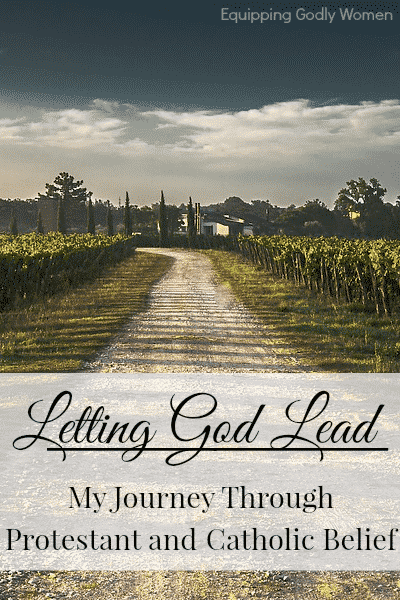
Enjoyed this post? Don’t miss the rest of the posts in the series!
The Day I Realized My Religion Got it Wrong
10 Common Catholic Church Myths that Critics Believe
Is the Eucharist Really Just a Symbol?
Who has the Ultimate Authority? A Biblical Look at Sola Scriptura
A Brief Look at the History of Christianity
What All Christians Should Know About Priests, the Pope and Confession
What Do Catholics Really Believe About Mary, Saints and Statues?
Infant Baptism or Believer’s Baptism? Which is Correct?
What is Purgatory? What are Indulgences?
Why Do Catholics….? Honest Answers to Your Burning Questions
Protestant and Catholic Beliefs Series Conclusion
Resources
I’m not asking you to believe because I say so. Please DON’T take my word for it! The purpose of this series is only to share what I’ve learned on my journey in order to inspire you to begin a journey of your own. Here are a few helpful resources to get you started.
*This post contains affiliate links, which means if you make a purchase, I may make a small commission at no additional cost to you. Thank you!
Catechism of the Catholic Church
Surprised by Truth: 11 Converts Give Biblical and Historical Reasons for Becoming Catholic by Patrick Madrid

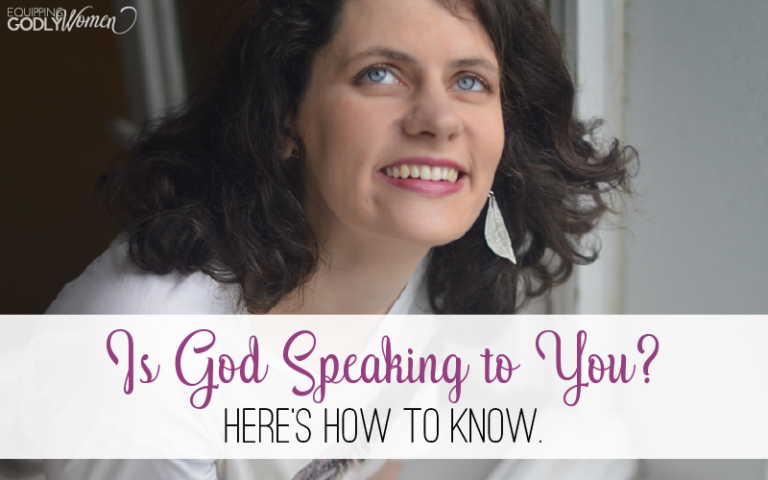





Hi Brittany,
I have been following you through this series and one thing on my mind is how you feel about the orthodox church- it was one of the original Christian churches (along with Roman Catholic) but separated so to different beliefs. We have a lot of Ukranian Orthodox Catholics in my area. I once had a professor who claimed Catholic and orthodox were th only true Christian denominations. But, anyway would love to know your thoughts.
Katie
My thoughts are–I have no thoughts because I know nothing about it! So far I’ve learned a lot about Protestantism from growing up in it and Catholicism over the couple years since my husband’s family is Catholic, but I don’t know much about the Orthodox Church. I definitely want to! If only I can find the time to study it more 🙂
As a very general statement, the Orthodox Churches and the Roman Catholic Church do not differ in any significant teachings, but they do differ primarily in the acceptance or rejection of there being a single head of the universal Church of Christ. For Catholics, the Pope is the successor of Peter as the first in authority among the apostles. For Orthodox, the Pope is only one of numerous co-equal successors of the apostles, originally one for each major national church (Greek, Russian, Ukrainian, etc.). The Catholic Church recognizes the validity of ordination and sacraments of the Orthodox Church (not sure if the opposite is true). Also for the record, there are Catholics other than Roman (aka Latin-rite) Catholics; they have their own rites but acknowledge the Pope as Supreme Head of the universal church. I think there are about a dozen. Some of those are the Coptic-, Maronite-, and Melkite-rite Catholics. There’s also the Ukrainian Catholic Church, which is in union with Rome, alongside the Ukrainian Orthodox Church, which isn’t.
Good to know! Thanks.
Katie, scragsma gave you a very basic explanation. I will add a couple of things.
The Orthodox didn’t exist for 1000 years. During this time, the whole Church held that the Bishop of Rome had primacy over the whole Church. Whenever there was a dispute between two or more bishops that could not come to an agreement, they ALWAYS turned to the Bishop of Rome.
Additionally, the Bishop of Rome claimed primacy because he always sat on the Chair of Peter (the apostle), to whom Jesus provided the Keys of the Kingdom. The first problem came sometime after the capital of the empire was moved to the new found city of Constantinople. At this time, some of the Eastern/Asian bishops wanted to elevate the patriarch of Constantinople to send in primacy, after Rome, but the Bishop of Rome turned it down, as it had happened in other instances when there was serious disagreements, and no sorting out, the Bishop of Rome was THE one to turn to.
Over time both ends of the empire drifted further apart. The Bishop of Rome was busy with an enormous task of the whole Roman Empire collapsing, and the threat of barbarians. The Church focused on evangelizing these. Both East and West drifted and relations were strained. The Eastern Churches broke into divisions primarily by country, while the Catholic Church continued to be universal.
Over the centuries, many Orthodox Churches have in parts or whole come back into union with the Catholic Church. There is a lot of dialogue between these Churches in overcoming the schism that took place 935 years ago, but solidified some 500 years ago.
The main difference is that the Catholic Church has a visible unity in the Chair of Peter, through the Bishop of Rome (the pope). The others have come to a position to claim nowadays that the Bishop of Rome held a primacy among equals, but a honorary title.
For anyone who truly studies history in context and looks without prejudice or agendas, the Catholic position is much stronger and verifiable.
Therefore, with the exception of the unity visible through the Bishop of Rome, the Orthodox Churches hold to the first seven Ecumenical Councils. The Catholic Church kept having its councils and doctrinally it has defined many more things over the centuries. Many of the things that have been formally defined are also believed and accepted in one sense or another by the Orthodox.
All these Apostolic Churches profess the 7 Sacraments. A hierarchy of bishops, priests, and deacons. In the last few centuries, some of these Orthodox Churches have been influenced theologically by Protestantism. Things such as contraception, divorce and remarriage, etc.
Interesting article. Again, as you’d expect, I disagree with large portions of it (I’m a Protestant after all), but it’s clearly written and covers hugely important topics. Three points I’d like to comment on (but, as always, feel free to delete my comments if inappropriate to this discussion):
1. I’m a little confused. Have you already made the decision to accept Catholicism? If you hold to all the tenets you’ve outlined as fact (I know you made exceptions on some), it sounds like you already have and merely need to schedule your formal acceptance into the Catholic Church. I certainly don’t want to encourage you to do so, as I do believe Protestant teachings to be more accurate, but if you already adhere to the authority of the Catholic Church and cite primarily Catholic sources, it sounds like you’ve already made the jump and are no longer uncertain. Be sure to carefully examine Protestant answers on key points though. That said, whatever decision you make, I would encourage you not to lose sight of Christ as your theological sands shift, as He is of supreme importance. Continue to seek His guidance, as you’ve already professed to do. I’m not at all saying you aren’t seeking Him; I’m just adding a voice to encourage you in your walk with Him, as all people face challenges when examining their core beliefs.
2. You note that Protestants teach the Bible is easily understood and addresses all of life’s problems. We do hold the Bible to be the ultimate authority among the forms of revelation we’ve been given, and we do hold that it is easily understood in certain aspects, but many of us have at least slightly more complex views than you describe. We know some specifics of the Bible are difficult to understand, and that’s at least part of the reason denominations like the one I’m a part of employ full-time pastors, have seminaries, and publish commentaries designed to help people understand. We just don’t believe those pastors, seminaries and commentaries are more authoritative than the Bible itself. We seek to understand the Scriptures because we believe they’re from God; we recognize that careful study is needed to understand them though.
3. Perhaps the one statement that concerns me most about your outline of Catholic views is as follows: “The Bible doesn’t have authority because IT says so; it has authority because the Church says so. The Bible is a gift from the church, not the head of the church.” Did the biblical books have no authority until the Church formally said so through an authoritative council, or were they the Word of God because they really were the Word of God from the moment they were written? If it took an authoritative council, then it doesn’t seem worthwhile to cite passages such as 1 Timothy to declare the authority of the Church, as, from what you’ve said, those passages are only authoritative because the Church declared them to be so in the first place. On the other hand, if the passages were the Word of God to begin with, then it seems their authority comes straight from God and precedes a formal church council declaring them to be so. In other words, they’re authoritative in their own right, and the Church over the years merely affirmed them to be so.
DCal90, In response to your #3 point, I think this article from Tim Staples addresses your concern: https://www.catholic.com/magazine/online-edition/the-protestant-achilles-heel
The following, I think, is a particularly relevant portion of the article (although I think it is well worth giving the whole article a read):
“When defending sola scriptura, the Protestant will predictably appeal to his sole authority—Scripture. This is a textbook example of the logical fallacy of circular reasoning which betrays an essential problem with the doctrine itself. One cannot prove the inspiration of a text from the text itself. The Book of Mormon, the Hindu Vedas, writings of Mary Baker Eddy, the Koran, and other books claim inspiration. This does not make them inspired. One must prove the point outside of the text itself to avoid the fallacy of circular reasoning.
Thus, the question remains: how do we know the various books of the Bible are inspired and therefore canonical?
. . .
The Protestant response at this point is often an attempt to use the same argument against the Catholic. “How do you know the Scriptures are inspired? Your reasoning is just as circular because you say the Church is infallible because the inspired Scriptures say so and then say the Scriptures are inspired and infallible because the Church says so!”
The Catholic Church’s position on inspiration is not circular. We do not say “the Church is infallible because the inspired Scriptures say so, and the Scriptures are inspired because the infallible Church says so.” That would be a kind of circular reasoning. The Church was established historically and functioned as the infallible spokesperson for the Lord decades before the New Testament was written. The Church is infallible because Jesus said so.
Having said that, it is true that we know the Scriptures to be inspired because the Church has told us so. That is also an historical fact. However, this is not circular reasoning. When the Catholic approaches Scripture, he or she begins with the Bible as an historical document, not as inspired. As any reputable historian will tell you, the New Testament is the most accurate and verifiable historical document in all of ancient history. To deny the substance of the historical documents recorded therein would be absurd. However, one cannot deduce from this that they are inspired. There are many accurate historical documents that are not inspired. However, the Scriptures do give us accurate historical information whether one holds to their inspiration or not. Further, this testimony of the Bible is backed up by hundreds of works by early Christians and non-Christian writers like Suetonius, Tacitus, Pliny the Younger, Josephus, and more. It is on this basis that we can say it is an historical fact that Jesus lived, died, and was reported to be resurrected from the dead by over 500 eyewitnesses. Many of these eyewitnesses went to their deaths testifying to the veracity of the Christ-event (see Lk. 1:1-4, Jn. 21:18-19, 24-25, Acts 1:1-11, I Cr. 15:1-8).
Now, what do we find when we examine the historical record? Jesus Christ—as a matter of history–established a Church, not a book, to be the foundation of the Christian Faith (see Mt. 16:15-18; 18:15-18. Cf. Eph. 2:20; 3:10,20-21; 4:11-15; I Tm. 3:15; Hb. 13:7,17, etc.). He said of his Church, “He who hears you hears me and he who rejects you rejects me, and he who rejects me rejects him who sent me” (Lk. 10:16). The many books that comprise what we call the Bible never tell us crucial truths such as the fact that they are inspired, who can and cannot be the human authors of them, who authored them at all, or, as I said before, what the canon of Scripture is in the first place. And this is just to name a few examples. What is very clear historically is that Jesus established a kingdom with a hierarchy and authority to speak for him (see Lk. 20:29-32, Mt. 10:40, 28:18-20). It was members of this Kingdom—the Church—that would write the Scripture, preserve its many texts and eventually canonize it. The Scriptures cannot write or canonize themselves. To put it simply, reason clearly rejects sola scriptura as a self-refuting principle because one cannot determine what the “scriptura” is using the principle of sola scriptura.”
Jared, thanks so much for sharing the article. I, of course, disagree with a number of points in it, but it is certainly thought-provoking and I really do appreciate you giving me the link. However, I am still unsure why the Catholic Church, as cited in Brittany’s post, says the Bible “is a gift from the Church” that has authority “because the Church says so.” This may be splitting hairs, so please forgive me if it is, but was the Bible the Word of God before there was a formal church declaration? Christ seems to have regarded at least parts of the Old Testament as being authoritative, for instance. If the Bible was the Word of God even before a formal church declaration, wouldn’t it have been a gift from God, rather than the Church–a gift that the Church merely affirmed? And wouldn’t it have authority in and of itself? If the Bible wasn’t the Word of God until the Church declared it so, I would be curious to read the text from the Council that did declare these books had become God’s Word. I probably should know which Council or formal statement first addressed the canon, but my memory eludes me at the moment, so any additional information would be helpful. Forgive me too if I overlooked any relevant information in Tim Sinks’ article. I don’t like it when people ask redundant questions, and hope I have not asked one here.
You haven’t. I just got bogged down with all the comments and I got behind! No, the Church didn’t make it the Word of God–they merely affirmed it. You are correct in this. HOWEVER, today–how do we, personally know that they got it right? We have to just take their word for it, pretty much.
Thanks for this! Very helpful! I would point out though, that Protestants don’t necessarily see the Scripture as inspired because the Bible says so. They just believe it is. The same way that the Catholic church believed that it was hundreds of years ago (and still does today). But the thing is, we really have no way of knowing for sure, so at this point when we believe, we pretty much just have to take the Church’s word on it.
1. I am still undecided. I am finding a lot of evidence that leans in that direction (this whole series is leaning in that direction pretty hard so far!), but I have yet to fully embrace it. And also–we’ve still got more ground to cover! So I really, truly don’t know.
2. yep, yep, yep. Sorry to make it sound so simplistic (there’s so much ground to cover in this series, I have to simplify whenever I can! lol)
3. Yes, I agree with all of that too. They were inspired because they were inspired and the church simply affirmed. BUT Protestants today have no way of knowing for sure which books were and were not inspired since we can’t fact-check that easily ourselves 2,000 years later, so we pretty much have to take the church’s word on it. I know, when I first believed the books were inspired, it wasn’t because I looked at each personally, but because I saw that they were part of something called “the Bible” so to believe in them because they were included necessitates a trust that the church did a good job.
Oh, and p.s. Your views are VERY much welcomed! The more information I have from both sides the better! The only comments I delete are those that are incredibly rude, hateful or malicious, and yours are not. If you have helpful information and you’re polite–then I want to hear it! 🙂
Thanks!
I have come to believe that you are a really sweet soul, DCal90. It is not my intention to offend you, but to clarify and point out some issues with statements made.
The first example I want to call to attention is: “as I do believe Protestant teachings to be more accurate”. I know you do believe this, but let me point something that I covered in the Eucharist post.
Under the umbrella of Protestant, you must encompass the various denominations. Although by now there are listed 35,000+ in the Oxford Encyclopedia, I would say that really there are hundreds of varying beliefs, and not 35,000+. Amidst these you have the Lutherans with co-substantiation. Reformed/Calvinism with a spiritual union of sorts. The remainder that go anywhere from nothing, but a symbol to anything in between.
Some of the groups celebrate the Last Supper every Sunday. Others once a month, while others only once a year. There are even some groups that came out of the original Protestant movement that don’t do it at all.
So, between these two items which one is the ‘accurate one’?
————
On this other item, “… but if you … cite primarily Catholic sources, it sounds like you’ve already made the jump and are no longer uncertain.” You seem to forget that she shared with us that she is deeply in love with the Lord and went to a Bible College to study.
————
Regarding this statement: “Did the biblical books have no authority until the Church formally said so through an authoritative council, or were they the Word of God because they really were the Word of God from the moment they were written?”
They were the Word of God, but they were not a single book, as we have today.
When St Paul talks about scripture he is ALWAYS talking about the Old Testament (OT), keep this in mind.
Even the cannon of the OT had not been officially decided by the Jews at the time of Jesus.
The Sadducee (the priests) accepted the Torah (first five books) and rejected the resurrection, while the pharisees accepted the Septuagint and believed in the resurrection.
By the time Jesus founded His Church, there were various groups with different claims on which books were inspired and authoritative. Once the Holy Spirit came upon the apostles, the Church was born, and was no longer bound to the old system of authoritative from the ‘Moses Seat’. Notice that Jesus does tell his disciples to follow scripture, but those in authority on “Moses Seat” (Matthew 23:2-3).
Here are some historical facts.
1. The early Christians use the Septuagint (Greek translation of the OT) 5 or 6 times more often than the Hebrew text, especially after the wide persecution that forced them to leave Palestine.
2. The Septuagint is quoted or referenced 300 of the 350 times that the NT writers quote or reference the OT. The Septuagint has the same cannon as the Catholic Bible, while the Protestant hold to the Jewish cannon that came later in the end of the first to middle of the second century from the Jewish school of Jamnia (not a council as it is commonly affirmed). From this same school that rejected the Septuagint (73 books) they chose for the Hebrew cannon 66 books. They also wrote prayers to be recited regularly to condemn the Christians.
Antonio, thank you so much for your input on my comments. I appreciate them and no offense is taken. You are, I think, better-versed in these matters than I. As a follow-up to your comments, I did want to note that when I said I adhere to Protestant teachings more than Catholic teachings, I meant I adhere to them in regard to the points of difference that Protestants normally cite: degree of authority of the Pope, veneration of Mary, definitions of justification, etc. I come from the Baptist/Presbyterian strain of Protestantism, so I’m most influenced by that. As you note, though, there are many strains and denominations of Protestantism and fewer strains of Catholicism. That is to be expected though, as two of the distinguishing marks of Catholicism today are allegiance to the Pope and church unity. By definition then, anyone who splits off is no longer really Catholic. Each group of Christians has distinguishing characteristics based on differences in belief. A Baptist might say that someone who accepts infant baptism is not really Baptist. A Presbyterian might say that someone who rejects all forms of Calvinism is not really Presbyterian. In this sense, analysis of the number of different denominations is not a great way in and of itself to hold the Protestant-Catholic debate, as all we really end up saying is that Catholics are united under the Pope, as is characteristic of Catholics, and Protestants are not. Even within the Catholic Church, there is elaborate debate over how to interpret authoritative councils and papal decrees, and there is even more debate over what has not yet been authoritatively defined. So differences of opinion and belief exist among Catholics, they just cannot split from the Catholic Church and still be considered Catholic in a technical sense. So the heart of the Protestant-Catholic debate does not stem from the number of strains of Protestantism, the heart of the debate is at least partly whether the Catholic Church is the sole legitimate Church in the world or one denomination with the distinguishing characteristic of being united under the Pope. On this point especially, you and I disagree, and I’m glad that we can do that respectfully. I should note also that this interpretation of the debate is why I asked Brittany if she is really undecided. For me, my frame of reference for ultimately authoritative revelation are the 66 books of the Protestant canon of the Bible. I may not interpret them correctly (as I don’t consider myself authoritative), but I hold that they are the genuine Word of God in their original manuscripts and, though preserved by God through the vehicle of his people and church institutions over the years, they stand in authority even over those people and over the institutions of the church. So to convince me of Catholicism, you have to either convince me that my frame of reference is wrong, or that my frame of reference logically demands Catholicism. When Brittany at first suggested that the Bible is the gift of the Catholic Church and that we have to take the Church’s word on its contents, and when she cited primarily (indeed almost solely) Catholic sources, I took that to mean her frame of reference had changed to recognizing the sole authority of today’s Catholic Church. If that was the case, it would be unreasonable not to go ahead and decide to be Catholic. She has since graciously clarified her position, and I was wrong. I’m satisfied to take her word that she is still undecided as of the last updates I read on this blog (I haven’t read the latest posts yet). In closing, thank you for sharing your thoughts with me. I’m glad that so many of the discussions on this blog are civil, as this is some of the most important subject matter we could conceivably discuss.
Just to clarify–many of my sources are Catholic, not because I’m purposely seeking them out, but because when I type a search into Google, most of the results are from Catholic sources! In my latest post on Christian history and whether or not the Apocrypha should be included, there’s a better mix of sources.
Hi, Brittany. I’ve been enjoying your posts in this series. I just wanted to say that under your reason number 6 above, I think you left out one of the most important verses that Catholics look to as support for the belief that the Holy Spirit guides the Church into all truth and prevents it from teaching error in matters of faith and morals:
I have much more to tell you, but you cannot bear it now. But when he comes, the Spirit of truth, he will guide you to all truth. He will not speak on his own, but he will speak what he hears, and will declare to you the things that are coming. He will glorify me, because he will take from what is mine and declare it to you. Everything that the Father has is mine; for this reason I told you that he will take from what is mine and declare it to you. (John 16:12-15 NABRE)
Jesus explicitly tells his apostles (and only his apostles) that he has much more to teach them but that it will be by the power of the Holy Spirit, who will lead them (the apostles) into all truth. Also important to note is that the above discourse, as well as the quotes that you provided from John 14, take place during the last supper, which is when Catholics believe that Jesus instituted the ministerial priesthood. Therefore, if we look at the context in which this promise was made, we see that it was made exclusively to the future leaders of the Church (the apostles) in connection with Jesus’ establishment of the office that will exercise the authority that you reference in point number 7.
I’m not saying that you have to agree with my analysis above, but I do think the passage from John 16 I quoted is perhaps the most important passage Catholics look to for support of your point number 6.
Added! Thanks!
And to add just a tiny bit.
The Church states that Divine Revelation ceased when the last apostle died.
Hence, she can not teach anything that contradicts what was initially handed down from the apostles.
I once had a debate with a girl that said you could only be saved by the word. That it was some kind of all powerful thing and God was incapable of speaking through any other way. Boy did I disagree. I have always believed the Bible is the word of God, but I don’t think it holds every answer. However, it is a basis by which we can judge as if a teaching contradicts scripture it is obviously false. On the other hand scripture itself can, at times, seem to contradict itself, and my dad used to say, to caution us, that any person can read practically anything they want to see in it, if they twist it enough. This very fact points out the need for more than just one persons interpretation. After all, one persons interpretation can create a power mad leader leading people to mass suicide, or something less extreme. On the other hand the church itself can be the source of bad teaching, catholic, protestant, non-denominational or what have you.
In some ways I agree with this post, in some ways not quite. I continue to find your series fascinating. You really could consider repackaging it into an e-book. Add more of your sorry and journey in, I think you’d have something.
I’ve thought about doing just that! Maybe someday I will! I’ll have to know the conclusion first though. I wouldn’t want to publish a let-down 🙂 And don’t worry, I’m not too sure about all of this either. Just presenting the facts as I find them, trying to be as unbiased as possible!
When you wrote this:
“Furthermore, we have to consider the purpose behind WHY the Bible was written.”
In reality, this is a two-part question, and you only discussed one part (why the individual books of the Bible were written). The second part of the question is VERY important to spend some time on. That second part is this:
“WHY were the books of the Bible collected together?”
Now obviously, this was a piece of the plan of salvation. But WHY did the Church, in the 4th century, decide to declare which books were, and which books were not in the Bible? The Church had existed and grown for almost 4 centuries (that’s older than the United States). Why did the Church decide to make this decision?
The answer is the Church was declaring which books could, and which books could not be read at Mass! To make sure that Masses throughout the Church were universal, the Church decided to declare which books could be read in the liturgy. Once the Church settled the matter, these books began to be collected together for ease and convenience. When that became the norm, the books to be read in the Mass became known as the “bible” (book).
It really gives great insight into the nature of the Bible when you understand that it is first and foremost a liturgical (worship) collection of books. It was meant for the Mass.
Hmm… that is a great additional point. Do you have any facts or sources to back it up though? (It’s okay if not!) Not having read about this point in particular, just based off of my own personal opinion, I would guess that the reason why they compiled them was to help define which ones were true and which ones were not. After all, there were plenty of other gospels going around at the time which were not inspired. As the church was growing and growing and the original apostles were gone, the people would need something to lead them in the meantime. By establishing an official canon, the church allowed other churches to read and learn for themselves a little more without having to have someone right there to make sure everything was correct. I’m sure it had a huge part in Mass, but I don’t know if it was compiled specifically for that purpose.
Take a look at the actual words from the Council of Carthage in 397AD.
“[It has been decided] that nothing except the canonical Scriptures should be read in the Church under the name of the divine Scriptures. The Canonical Scriptures are these: Genesis, Exodus, Leviticus, Numbers, Deuteronomy, Joshua the son of Nun, Judges, Ruth, four books of Kings, two books of Paraleipomena, Job, the Psalter, five books of Solomon, the books of the twelve prophets, Isaiah, Jeremiah, Ezechiel, Daniel, Tobit, Judith, Esther, two books of Esdras, two books of the Maccabees. Of the New Testament: four books of the Gospels, one book of the Acts of the Apostles, thirteen Epistles of the Apostle Paul, one epistle of the same [writer] to the Hebrews, two Epistles of the Apostle Peter, three of John, one of James, one of Jude, one book of the Apocalypse of John. Let this be made known also to our brother and fellow-priest Boniface, or to other bishops of those parts, for the purpose of confirming that Canon. Because we have received from our fathers that those books must be read in the Church. Let it also be allowed that the Passions of Martyrs be read when their festivals are kept.”
Notice that it is specific about what is read “in the Church”. And it is referring to Mass because at the end you notice they mention “festivals”, these are the feast days of the saints and the festivals are the Mass celebrated on that day.
Also notice, the Pope (Boniface) is needed to confirm their declaration and the Canon. The bishops in that Council recognized the Pope’s authority and his ability to invalidate or affirm their declaration.
http://en.wikipedia.org/wiki/Councils_of_Carthage
Hope that helps!
Very interesting! Thanks!
That was the ‘thing’. Which books could be read in the Liturgy; the Mass.
Thank you for this series, Brittany! I too am on a journey of finding a “denomination” to be a part of. I was raised Catholic. I am not opposed to the teachings or traditions, but find myself searching for more spiritual fulfilment. My grandma gave me one of Joel Osteen’s books when I was in high school and I was amazed at what he revealed that is available to believers. Nothing I have ever heard about in the Catholic Church. At that age, I never really thought about whether what he was saying was truth. All I knew was that I was thirsting for more. From Joel, I found Joyce Meyer, Rick Warren, and Ed Young, all of which are non-Catholic speakers of the word. Their messages are so rich and bring so much light to my life. They also speak of small groups to learn more of the word which I began to long for. What a great opportunity to make regular time of the word and meet people as well. This opportunity didn’t seem to be available in the Catholic church, so the idea of try other denominations became very real. My best friend, who lives several miles away from me to attend college, is a non-Catholic but a Christian and has attended several churches such as Anglican, Baptist, Pentecostal, and Lutheran. She has such a strong relationship with God and that’s what I was looking for. So I decided I was going to try a different church. I pushed it off for quite a while because I didn’t want to go alone when it would be such a different and new experience. She came to visit me not long ago and she came with me to an Alliance church. It was great and I enjoyed the experience, and I knew that this is the kind of church I was looking for. I loved the worship and message they delivered that day. I then attended a Pentecostal church and was amazed at the service. In fact, I cried when the service was over. I felt so overwhelmed to think God finally answered my prayer. When I told my parents, they were upset. Needless to say, they were not so thrilled about my attendance. My faith has been tested a lot in the recent months. I still don’t know my direction. Who knew finding a church, where you’re supposed to worship and show God your love, would be so difficult. I also wonder why things are the way they are in “religion”. I just want to find truth. I guess a lot of questions in life will go unanswered. I’m praying for you on your journey. I know what you’re going through. I look forward to hearing the conclusion, and future posts as well. All the best and God bless 🙂
Jessica, I felt the same way like you: ” I was raised Catholic. I am not opposed to the teachings or traditions, but find myself searching for more spiritual fulfilment.”
I was questioning my faith very much, I wanted to feel closer to God and felt thet the Catholic church wasn’t giving me that.
But then I started to really study the teachings, kind of like what Brittany does in this series and things became more and more clear. Did you read the post about the Eucharist? Really, you can never be closer to God then when recieving Him in the Communion.
The writers you metioned are famous new-age writers. I have read some new-age books (Paulo Coehlo being the most famous). They offer “instant spirituality” that doesn’t have real depth. It also combines different teachings – like those about reincarnation, karma etc.
Coming from someone who has been there: I really hope you try to find the answers in Catholic teachings, read the Catechism and talk to a priest about your doubts and feelings.(and continue reading this series 🙂 )
I wish you the best!
Joyce Meyers and Rick Warren are definitely Protestant–not “New Age.” While I have not read a bunch by them, they definitely should not be teaching karma or reincarnation.
Sorry, I should’ve been more clear – I meant that the new age philosophy teaches those things, not all of the authors metioned by Jessica. Joel Osteen definitely is a new age author. I’m really not big on the conspiracy theories, but some things Joyce Meyers claims were super weird to me, (and also to a lot of Protestants) like Jesus being sent to hell after His death where he was tortured by Satan for our sins, and that on the Cross he became “the sin itself” and ceased being the son of God.
She’s not a self proclaimed new age author, but I don’t think this is a part of Protestant faith and teachings.
P.S. Although I’m Catholic and I don’t believe the “sola scriptura” principle(is that gramatically correct? English is not my first language, sorry :)), I really look up to Protestants for knowing the Bible so well and reading it often.
Okay–just wanted to make sure! Like I said, I haven’t read their work extensively, but those are definitely not traditional Protestant teachings. (No worries–I totally never would have guessed you weren’t a native English speaker). and yes, I love that about Protestantism too. I hope this series will inspire everyone–regardless of denomination–to dive into the Word more.
Actually there are only a half dozen or so doctrines that are critical foundations in Protestantism. The rest is wide open for interpretation.
Some of those names are what some of us call the ‘Health and Wealth Gospel’ believers/teachers.
Finding the right church IS complicated! I would encourage you, though, to make sure you don’t just base your decision on what “feels” right–but on what is based in truth as well. And past that–well, I’m no help. I’m still trying to figure this out as well 🙂
Thank you for all of your advice and support ladies! God bless 🙂
Brittany is giving you solid advice. ‘Feelings’ are the most deceptive thing. One moment we feel up and another moment down. We must walk by faith and seek truth because that is what God asks of us. We should earnestly seek truth because truth is a person’ Jesus Christ. Wherever the WHOLE Truth exists, there is Jesus.
Feelings can be like a drug. Every time we need a stronger dose to keep the high, until it becomes boring, and we seek that fulfillment elsewhere. Be cautious.
I am going to challenge you , Jessica.
Next time you go to Mass, listen attentively to the prayers the priest says. Enter into the prayers (live them). Doesn’t matter if he is a good preacher or not. Pick a word or sentence that touches your heart and carry it with you. Additionally, visit the Blessed Sacrament and talk with the Lord. Pour your heart, pains, joys, etc. Then listen quietly as you open your heart in the peace and quietness of that moment.
Do this for a while, before you go looking elsewhere.
Sometimes we are looking for greener pastures elsewhere, yet we miss taking a good look around and notice the beauty that surrounds us. Don’t be so eager to follow your emotions; be patient.
I still remember too much emotion, too many feelings, and heartbreaks.
I am loving this series. I was raised Catholic and attended Catholic shool for 7 years. I was Catholic because I was supposed to be. I later began to look around at different denominations and began attedning a little Free Methodist church, a far cry from the Catholic mass. I was discouraged almost immediately at the disrespect that the churches I was attending had for the Catholic church. I have never once sat in a Catholic mass and heard a Priest discuss other denominations as bad or indifferent or judges based on different belifs. I find this series enlighning and beneficial for someone like myself who too is searching for truth.
I actually never heard any negative talk about Catholics growing up Protestant. I figured we were all just variations of the same thing, but Catholics were a little more “out there” than most. 🙂 I didn’t even know the whole anti-Catholic thing was a thing until I started researching for this series. (and my husband thought I was nuts, like “How did you not know this??” lol)
Just wanted to encourage you to look into Eastern Orthodoxy as well as Roman Catholicism as an answer to the problems of Protestantism.
Thanks, I plan to!
Hi Brittany, I am absolutely loving your Protestant/Catholic journey and reflections. While I was a cradle Catholic, it wasn’t until college that I began to fully understand Christ and His Truth. I fell away from Catholicism during high school and leaned more towards Protestantism. It was the summer before high school when I prayed for God to reveal which religion I should follow and if Protestantism, which denomination? God, in His loving mercy, gradually revealed the complete fullness of His Truth, leading me to His presence in the Holy Eucharist.
I’m 24 now and to this day, I regret how long it took me to understand the faith, how little I appreciated it. My prayer for all people is to follow Christ and discover the burning love He has for every person and how He waits for us in the Eucharist. May He bless your journey 🙂
Better late than never! 24 is still pretty young 🙂 and thanks!
Processing and thinking on what you have written, Brittany, but I love that you are studying and writing and asking questions. I have enjoyed reading through the comments, especially where circular reasoning, logic, fallacy, and interpretation become the vernacular.
Having friends on so many sides of religion, I have pondered many of the very things you have shared. I will admit that, initially, there is much my very scripture loving heart wants to defend with regard to your post, but I also appreciate that you are doing just what Isaiah 1:18 says to do, REASON together.
I haven’t been able to read the other posts, yet, but I will take some time to sort through them because I appreciate the time you are taking to ask these questions.
Blessings,
Dawn
Don’t worry, I am a HUGE fan of Scripture too (I went to Bible college for a reason 🙂 ) But I think part of that needs to be giving Scripture the proper place, which includes acknowledging its limitations. Just because it can’t be the “be all end all” does not mean that it isn’t incredibly, incredibly important though!